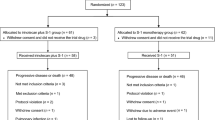Abstract
Background
Fluorouracil (FU), platinum (PT), and taxane (TAX) therapy was the standard chemotherapy for esophageal squamous cell carcinoma (ESCC) before the era of anti-programmed death-1 antibodies. The aim of this phase II trial was to evaluate the efficacy and safety of S-1 monotherapy for patients with recurrent or metastatic (R/M) ESCC resistant or intolerable to FU, PT, and TAX therapy.
Methods
Eligible patients had R/M ESCC; no prior S-1 use; were intolerant or refractory to prior FU, PT, and TAX therapy; aged ≧ 20 years; and Eastern Cooperative Oncology Group performance status 0 or 1. S-1 was administered orally from days 1 to 28, every 6 weeks until disease progression. The primary endpoint was the disease control rate (DCR) for each patient, assessed by Response Evaluation Criteria in Solid Tumors, version 1.1. Secondary endpoints were overall survival, progression-free survival, time to treatment failure, response rate, and toxicity.
Results
Between October 2015 and December 2017, 17 patients were recruited, and the trial was terminated because of slow accrual. The DCR was 46.7%. The response rate was 13.3%. The median progression-free survival was 2.0 months. The median time to treatment failure was 1.9 months. The median overall survival was 8.4 months, and the 1 year overall survival rate was 30.5%.
Conclusions
Although this trial closed early because of slow accrual, we observed modest clinical activity with S-1 in patients with R/M ESCC who could not tolerate or whose tumors were refractory to FU, PT, and TAX therapy.

Similar content being viewed by others
References
Siegel RL, Torre LA, Jemal A. Global cancer statistics 2018: GLOBOCAN estimates of incidence and mortality worldwide for 36 cancers in 185 countries. CA Cancer J Clin. 2018;68:394–424.
Watanabe M, Tachimori Y, Oyama T, et al. Comprehensive registry of esophageal cancer in Japan, 2013. Esophagus. 2021;18:1–24.
Kato K, Cho BC, Takahashi M, et al. Nivolumab versus chemotherapy in patients with advanced oesophageal squamous cell carcinoma refractory or intolerant to previous chemotherapy (ATTRACTION-3): a multicentre, randomised, open-label, phase 3 trial. Lancet Oncol. 2019;20:1506–17.
Kojima T, Shah MA, Muro K, et al. Randomized phase III KEYNOTE-181 study of pembrolizumab versus chemotherapy in advanced esophageal cancer. J Clin Oncol. 2020;38:4138–48.
Nomura M, Iwasa S, Tsushima T, et al. Active salvage chemotherapy versus best supportive care for patients with recurrent or metastatic squamous cell carcinoma of the esophagus refractory or intolerable to fluorouracil, platinum, and taxane. Cancer Chemother Pharmacol. 2016;78:1209–16.
Akutsu Y, Kono T, Uesato M, et al. S-1 monotherapy as second- or third-line chemotherapy for unresectable and recurrent esophageal squamous cell carcinoma. Oncology. 2013;84:305–10.
Tamaoki M, Ezoe Y, Aoyama I, et al. S-1 salvage chemotherapy for esophageal squamous cell carcinoma refractory to the standard chemotherapy. J Cancer Sci Ther. 2017;9:353–7.
Ito T, Honma Y, Hirano H, et al. S-1 Monotherapy after failure of platinum plus 5-fluorouracil chemotherapy in recurrent or metastatic esophageal carcinoma. Anticancer Res. 2019;39:3931–6.
Kikuchi O, Ohashi S, Nakai Y, et al. Novel 5-fluorouracil-resistant human esophageal squamous cell carcinoma cells with dihydropyrimidine dehydrogenase overexpression. Am J Cancer Res. 2015;5:2431–40.
Kudo T, Hamamoto Y, Kato K, et al. Nivolumab treatment for oesophageal squamous-cell carcinoma: an open-label, multicentre, phase 2 trial. Lancet Oncol. 2017;18:631–9.
Sun JM, Shen L, Shah MA, et al. Pembrolizumab plus chemotherapy versus chemotherapy alone for first-line treatment of advanced oesophageal cancer (KEYNOTE-590): a randomised, placebo-controlled, phase 3 study. Lancet. 2021;398:759–71.
Doki Y, Ajani JA, Kato K, et al. Nivolumab combination therapy in advanced esophageal squamous-cell carcinoma. N Engl J Med. 2022;386:449–62.
Author information
Authors and Affiliations
Corresponding author
Ethics declarations
Ethical Statement
Written informed consent was obtained from all patients. The study was approved by the institutional review board of each institution and was conducted in accordance with the Declaration of Helsinki and was registered in the University Hospital Medical Network Clinical Trials Registry in Japan (UMIN000016830; http://www.umin.ac.jp/ctr/).
Conflict of interest
Motoo Nomura, Takayuki Kii, Junji Kawada, Masashi Hirota, Jin Matsuyama, Toshio Shimokawa, and Toshimasa Tsujinaka do not have conflicts of interest to declare and do not have financial or funding support to disclose. Takashi Ohta has received honoraria from Bristol-Myers Squibb, Chugai Pharmaceutical, Teijin Pharma, and Takeda Pharmaceutical, and research funding from Takeda Pharmaceutical. Daisuke Sakai has received honoraria from Chugai Pharmaceutical, and Daiichi Sankyo, research funding from Eli Lilly, scholarship donations from Chugai Pharmaceutical, Ono Pharmaceutical, and Yakult Honsha. Yukinori Kurokawa has received lecture fees from Taiho Pharmaceutical. Hisato Kawakami has received grants from Chugai Pharmaceutical, Eisai, Kobayashi Pharmaceutical, and Taiho Pharmaceutical, consulting fees form Daiichi-Sankyo, honoraria from Bayer Yakuhin, Bristol-Myers Squibb, Chugai Pharmaceutical, Daiichi Sankyo, Eli Lilly Japan, Glaxo Smith Kline, Merck Biopharma, MSD, Ono Pharmaceutical, Otsuka Pharmaceutical, Taiho Pharmaceutical, Takeda Pharmaceutical, Teijin Pharma, and Yakult Pharmaceutical Industry. Taroh Satoh has received honoraria from Bristol-Myers Squibb, Daiichi Sankyo, Eli Lilly, and Ono Pharmaceutical, research funding from Bei Gene, Chugai Pharmaceutical, MSD, Ono Pharmaceutical, and Yakult Honsha, scholarship donations from Taiho Pharmaceutical, endowed chairs from Chugai Pharmaceutical, Ono Pharmaceutical, and Yakult Honsha.
Human rights statement and informed consent
All procedures were in accordance with the ethical standards of the responsible committee on human experimentation (institutional and national) and with the Helsinki Declaration of 1964 and later versions. Informed consent or substitute for it was obtained from all patients before inclusion in the study.
Additional information
Publisher's Note
Springer Nature remains neutral with regard to jurisdictional claims in published maps and institutional affiliations.
Supplementary Information
Below is the link to the electronic supplementary material.
Rights and permissions
About this article
Cite this article
Nomura, M., Kii, T., Kawada, J. et al. A phase II study of S-1 therapy for patients with advanced and recurrent esophageal cancer resistant or intolerable to fluorouracil, platinum, and taxane therapy (OGSG 1404). Esophagus 19, 711–716 (2022). https://doi.org/10.1007/s10388-022-00931-8
Received:
Accepted:
Published:
Issue Date:
DOI: https://doi.org/10.1007/s10388-022-00931-8




